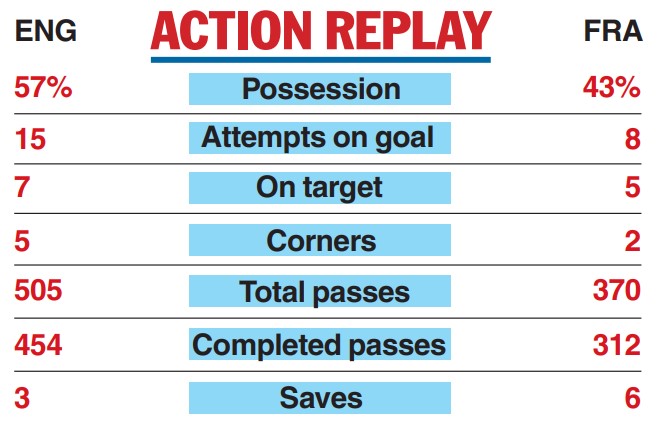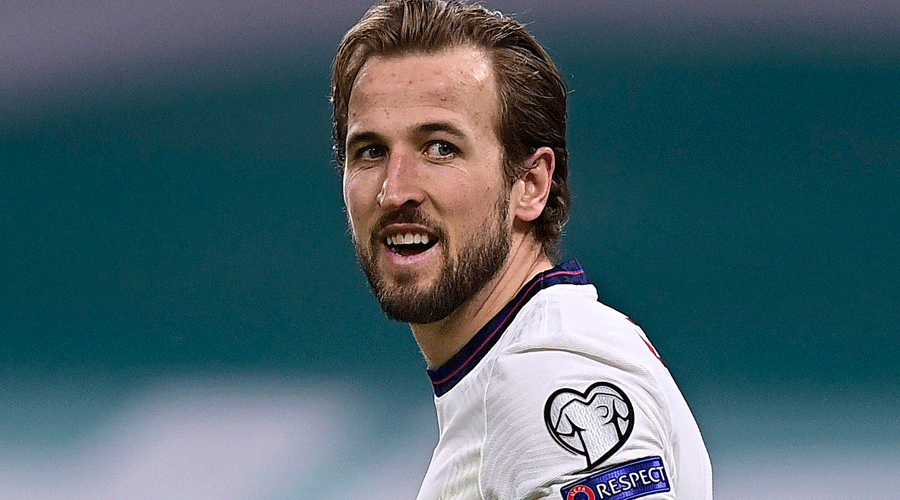For England, it ended as it always does, as it always seems like it must: with a penalty missed or an opportunity wasted, a fallen hero holding his head in his hands, replaying that moment, the one when it all fell apart, over and over in his mind, wanting nothing more than a chance to rewind, to do it all again, to make it right.
There will, in the days to come, be plenty of recrimination as England pick over the bones of their 2-1 defeat to France on Saturday in the quarter-finals of the World Cup, as they come to terms with another exit, another disappointment, another few years of hurt.
It is, or at least it has become, a natural part of the cycle, a chance for catharsis, collective therapy or just some good, old-fashioned bloodletting, depending on the circumstances.
A little of that will find its way, inexorably, to Harry Kane, the team’s captain, the most prolific goal-scorer in his country’s history, and inevitably, then, the player who missed the penalty that might have taken the game to extra time, that might have kept England in Qatar for a little longer.
He will not be alone. Gareth Southgate, the manager, will attract his share of criticism, too, as the country’s most successful manager for half a century weighs whether he has the “energy” to continue into a fourth major tournament, to do it all again.
Much of it, though, will be directed at Wilton Sampaio, the Brazilian referee, a man who achieved the rare feat of becoming England’s anointed villain despite awarding Southgate’s team two penalties.
The principal accusation centred on France’s first goal, a whistling, fizzing laser of a shot from the midfielder Aurélien Tchouámeni that capped a move England very clearly felt started with a foul on Bukayo Saka. Sampaio waved away the protestations; his video assistants did not see enough of an error to intercede.
There were, however, other apparent offences: a penalty claim from Kane, in particular, which was certainly a foul but was not, on more detailed review, actually in the penalty area; a succession of hair-splitting free kicks awarded against England; an array of French transgressions that seemed to pass by unnoticed. With each one, England’s fury and frustration mounted, Southgate and his staff growing more and more agitated on the sideline.
Once the critiques have subsided, though, once culpability has been assigned and internalised, another emotion will come to the fore. More than anything, England will look back on this game with regret.
Over the last three weeks, France — and France alone — have seemed to be on cruise control in Qatar. Argentina’s campaign has been conducted exclusively on a fraught, emotional knife-edge. Brazil seemed somehow giddy right up until the point that they were dumped out by an obdurate, unyielding Croatia. Portugal faced the existential angst of dropping Cristiano Ronaldo. Morocco have been backed by a gathering swell of pride from across Africa and the Middle East. The Dutch faced no little domestic opprobrium for their uncharacteristic conservatism. Even England, largely unflustered during their stay, teetered a little after enduring the apparently unbearable indignity of drawing with the United States.
France’s progress, by contrast, had been ominously serene: two straightforward wins in the group phase, a defeat against Tunisia that nobody seemed to notice — at least in part because French television cut away after what appeared to be a late equaliser, neglecting to show the audience that it was subsequently ruled out — and then a breezy victory against Poland in the Round of 16.
Against England, though, that sang-froid almost proved France’s undoing. Tchouámeni’s goal seemed to lull his team into a torpor. Gradually, it stripped any urgency from its play, any impetus, as if expecting England simply to succumb. The reigning champion, France ceded first territory and then control. They sat back, rested on their laurels, rode their luck. Eventually, they were made to pay: Tchouámeni tripping Saka, Kane sending the subsequent penalty past his opposing captain and Tottenham teammate, Hugo Lloris. At that point, the wind seemed to be at England’s backs. France’s vaunted attacking line, spearheaded by Mbappé, had been peripheral to the game; their midfield was being overwhelmed; Deschamps seemed curiously reluctant to try to wrestle back control.
That was England’s chance: not just to prove, as Southgate said, that it could “go toe to toe” with an elite team, a champion team, but to beat one; to claim a place not just in a third straight tournament semifinal, but to set up a meeting with Morocco, spirited and inspired but an indisputable underdog; to glimpse a path to the World Cup final, open and inviting, at its feet.
That it did not take it will haunt Kane, Southgate and the rest of his players for some time. France mustered no more than a few seconds of menace — Olivier Giroud denied by Jordan Pickford, the subsequent corner worked out to Antoine Griezmann, a flashing, perilous cross, Giroud offering no second chances — to seize the lead once more. England, by contrast, were not nearly as unforgiving.
There was nobody, Southgate said, who he would rather entrust with a penalty than Kane. “He’s the best,” he said. “He’s the best,” he said again, as if for emphasis. Kane could not, though, deliver again, not this time. The psychology was complex, he suggested, the pressure intense. “It was a second penalty,” Southgate said. “Against a goalkeeper who knows you well.”
Kane’s effort sailed over the bar, England’s hopes for another four years disappearing off into the night. He bit his jersey, held his head in his hands. Lloris punched the air in delight, his teammates flooding to him to congratulate him, presumably for signing for Tottenham a decade ago just so that he could scramble Kane’s thought processes in the Gulf a decade later.
France remain on course to become the first team since Brazil, back in 1962, to retain the World Cup title. It has had the air, throughout this tournament, of a team that suspects it knows how all of this ends.
It is that, for England, which will make the pain even sharper: that for the first time, here, as they stared down the world champion and found nothing to fear, they had dared to believe things might be different.
New York Times News Service











